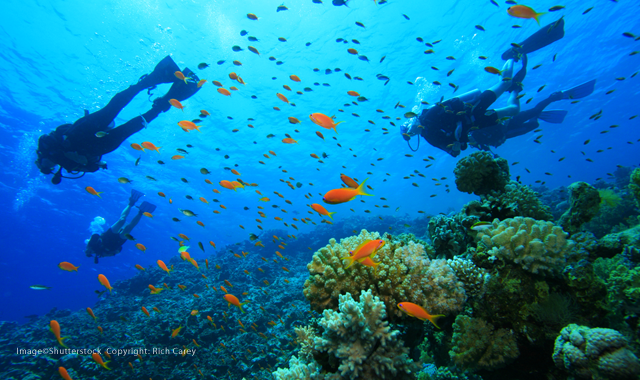Why the beach might be the best place to open a new practice
We take a look at a University of Buffalo study on the effects of scuba diving on oral health.

Scuba diving can have a direct impact on the amount of dental symptoms a person may experience.
According to a new University of Buffalo study, as reported at newswise.com, a whopping 41 percent of divers experience dental symptoms while in the water. This is due to the constant jaw clenching involved, along with the frequent and rapid changes in atmosphere. The symptoms experienced could be anything from tooth, jaw and gum pain to loosened crowns and broken dental fillings.
The study, "Prevalence of dental problems in recreational SCUBA divers" appeared in the November 2016 issue of the British Dental Journal. The study recommends that recreational divers talk to their dentist before diving if they recently had dental work done.
Of the 41 participants who reported dental symptoms, 42 percent experienced barodontalgia, 24 percent reported pain from holding the air regulator in their mouths too tightly and 22 percent reported jaw pain. Another five percent experienced loosened crowns during the dive, and one person even reported a broken dental filling.
"Divers are required to meet a standard of medical fitness before certification, but there are no dental health prerequisites," says the lead author Vinisha Ranna, BDS. She is a student in the UB School of Dental Medicine, and is also a certified stress and rescue scuba diver.
"Considering the air supply regulator is held in the mouth, any disorder in the oral cavity can potentially increase the diver's risk of injury. A dentist can look and see if diving is affecting a patient's oral health."
The research was inspired by Ranna’s first experience scuba diving in 2013. She experienced barodontalgia and was inspired to look into the problem.
There are few published studies regarding recreational divers, says Ranna, because they tend to focus on military divers. She conducted her own study so she could learn more about the problem. She created an online survey that she gave out to 100 certified recreational divers. Those who were under 18, ill or taking decongestant medication were excluded.
“The potential for damage is high during scuba diving,” says Ranna. “The dry air and awkward position of the jaw while clenching down on the regulator is an interesting mix. An unhealthy tooth underwater would be much more obvious than on the surface. One hundred feet underwater is the last place you want to be with a fractured tooth.”
Ranna says that she hopes to see oral health requirements taken into consideration for scuba certification. She is conducting a new study with over 1,000 participants to glean even more data.
Additional investigators on the study include Hans Malmstrom, DDS, professor; Sangeeta Gajendra, DDS, associate professor; Changyong Feng, PhD, associate professor; and Michael Yunker, DDS, assistant professor, all of the University of Rochester School of Medicine and Dentistry.
Ranna earned her bachelor of dental surgery from the Government Dental College and Hospital, Mumbai. Ranna is earning her DDS at the UB School of Dental Medicine through the International Dentist Program, a two-year program for internationally-trained dentists who seek to practice in the U.S.